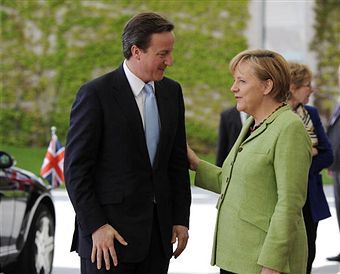 Angela Merkel’s fall from favour is something David Cameron ought to bear in mind as he
looks for lessons to guide his term in office.
Angela Merkel’s fall from favour is something David Cameron ought to bear in mind as he
looks for lessons to guide his term in office.
The German chancellor could do no wrong when she was first elected. A new “Iron Lady”, she was seen as a giant among pygmees. Tony Blair was leaving the scene, Nicolas Sarkozy had yet to be elected, the newspapers swooned, the voters applauded.
Mrs Merkel was respected in the US and Europe. She made her unwieldy coalition with the Social Democrats work, almost singlehandedly picked the NATO secretary-general and ruled over EU meetings.
Now, EU commission president Jose Manuel Barrosso is (rightly) calling her “naïve” for suggesting new EU treaty changes, and her handling of the Greek crisis was either incompetent or short-sighted. As I wrote some time ago, when I visited Berlin at the beginning of the Greco-German crisis I was struck by how ill-prepared, intellectually that is, her advisers were for the crisis.
It was as if they deliberately ignored what they did not like. They did not want to hear that the last ten years of German export-driven growth had helped create the debt in Greece. They were closed to the idea that other countries had paid indirectly for economic conditions that favoured Berlin. And they thought they had all the time in the world before they could ride to Greece’s rescue.
Her terms in office have seen many achievements, for example on Germany’s links to Russia and Poland, but these may pale in significance next to the setbacks. There are lessons here from the German Conservative-Liberal government to the British Conservative-Liberal government. Three spring to mind: What is unpopular may nonetheless be right; What is unpalatable now may in these volatile times prove to be better than future options; and, finally, though leaders should listen to their voters, parliamentarians and friends, they are elected to lead not to follow.






Comments